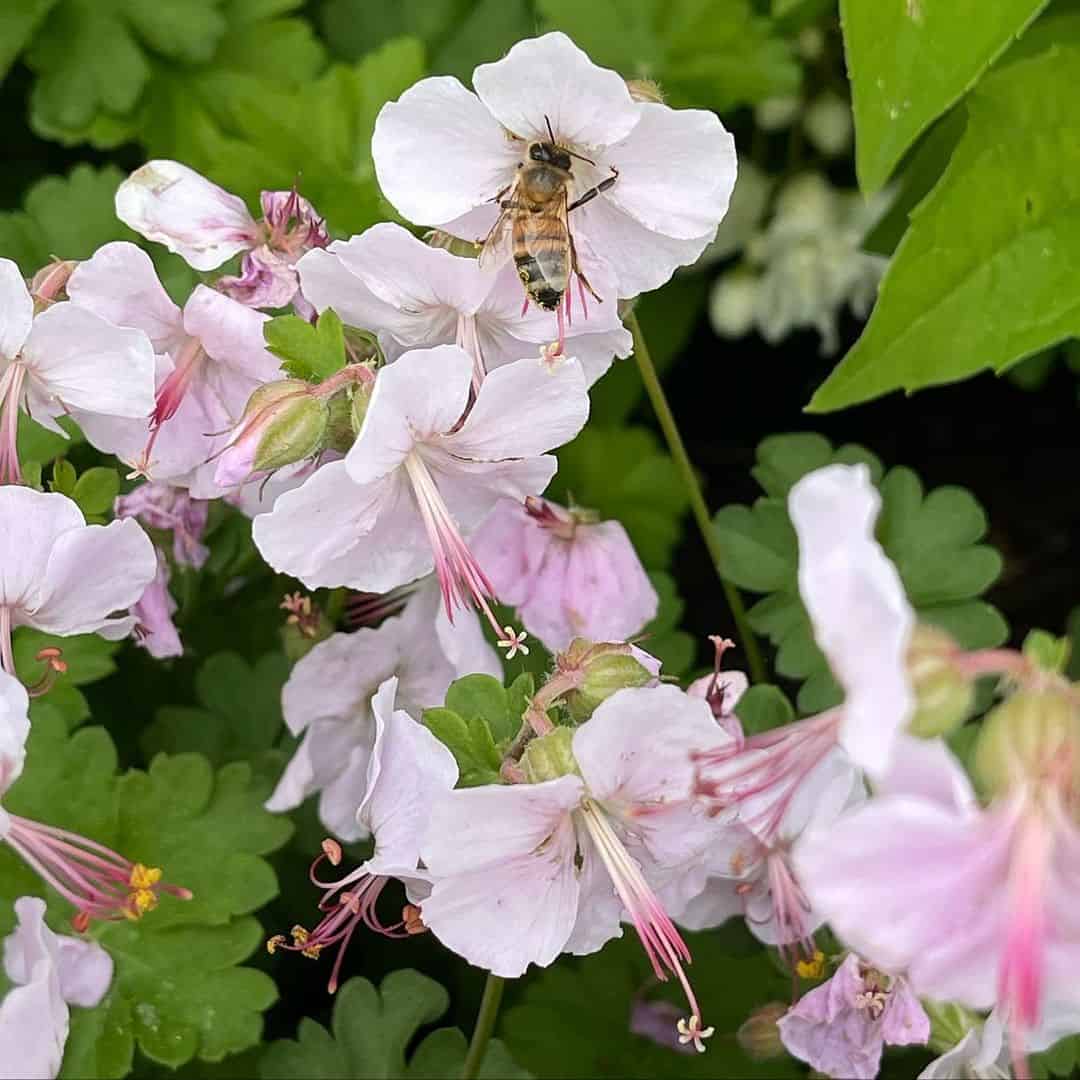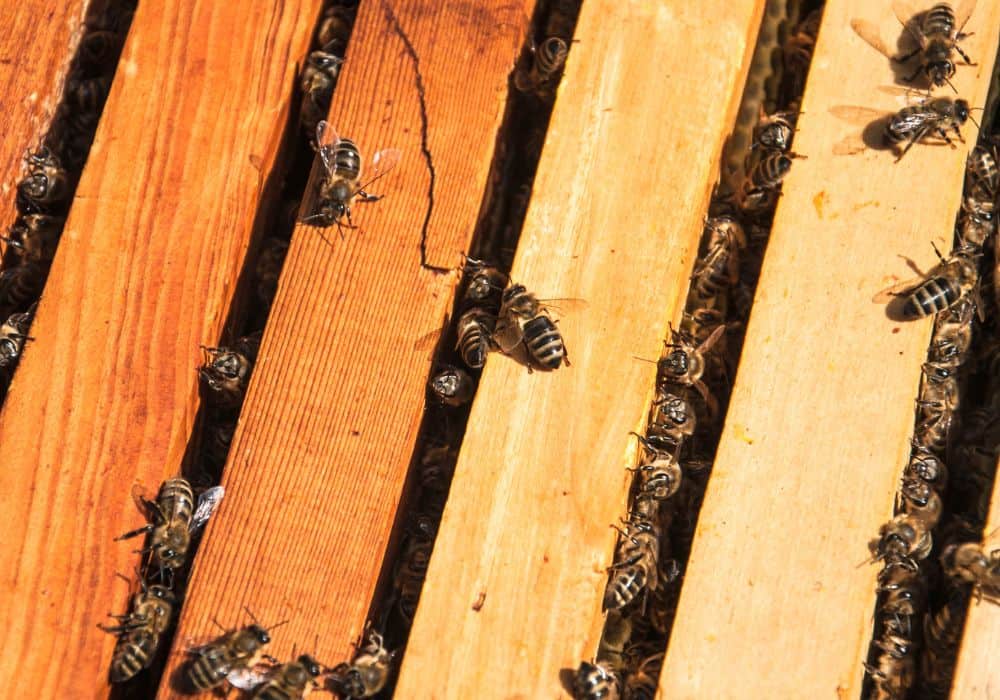From aiding in the growth of trees and flowers to the production of the much sought-after honey obtained from the honeycomb, the importance of bees to the environment and ecosystem, in general, cannot be overstated.
However, these fuzzy-winged insects can be pretty dangerous, and one sting from a bee could land you in the hospital.
So, if you are allergic to bees and dread getting stung by a bee, you need to figure out a way to keep them away. In this article, we’ve put together several smells that are, although harmless to bees, potent in driving bees away from your environment.
So, what smell do bees hate?
Although it is no news that bees are drawn to the sweet smell of flowery plants, these winged insects detest the following smells:
- Peppermint
- Citronella
- Fresh cucumbers
- Cloves
- Garlic
- Cinnamon and several essential oils from plants they dislike.
Also, it’s unlikely that you would find a bee around citrus and vinegar.
In this article, we answer the question, what smell do bees hate, and also provide ample reasons why keeping bees at bay might be the right move.
Reasons to Keep Bees Away from Your Surroundings
To reiterate, over 75% of the world’s raw food is dependent on these pollinators, so without a doubt, they are essential for our survival. However, having them around might not always end up being a pleasant experience for you and those around you, and we’ll tell you why.
1. Bees Sting and Cause Allergic Reactions
Although a regular sting from a bee can be remedied easily and would only cause swelling and redness, there are severe cases of anaphylaxis, where a sting from a bee can trigger anaphylactic shock. Anaphylaxis is life-threatening if not treated on time.
So, if you know that you suffer from severe allergies to bees, ensure that you take all measures possible to keep bees away so that you do not end up in life-threatening situations.
2. They Cause Damage to Properties
Bees do not live alone; they live in colonies. So, if a bee hive is close to your home, there is a great tendency that these bees will cause damage to your walls and home insulation. This damage will, without a doubt, be expensive to repair.
If a swarm of bees invades your home, they will continue to reproduce, and the more they are, the more damage they can do to your home.
N.B: A typical bee hive contains about 50,000 bees.
9 Tested and Trusted Smells that Will Keep Bees Away

Image Credit: bellewest
If you don’t want bees around your home, you can use several natural bee repellents to keep them away. Thankfully, many of these repellents are safe to use and readily available.
1. Peppermint
The peppermint plant is one plant that bees do their best to avoid. These pollinators avoid gardens with this plant because of the mint smell this plant releases.
So, if the area you intend to use peppermint plants to keep bees away is a small garden, we recommend using essential oils in peppermint flavor.
You can choose to dip a ball of cotton wool inside a bottle of peppermint essential oil that doesn’t contain any preservatives or additives, then place it in the preferred spot. Or, use a spray bottle to sprinkle the peppermint essential oil around your home at intervals.
Finally, if your peppermint plant is in an open space, it is easy for its scent to become diluted in the air. In such situations, your best bet is to consider spreading the peppermint plant and extending it along the areas you don’t want bees to come near.
2. Citronella
Citronella is an extract from an Asian grass plant called Cymbopogon. It is known for its sour smell that can deter bees and bugs; this is why the extract is a crucial element in making many mosquito repellants.
A common way to use this scent to keep bees away is through the citronella candle. This candle which is readily available in stores need only be lit after the beehive is located. Once you locate and light the candle, place it in that area and watch as the bees disappear.
This method is quite effective and you’ll also be pleased to learn that these candles can burn for up to 30 hours, so you do not have to worry about the candle going off on time.
Finally, although there is always the choice of dipping cotton in citronella oil, using a spray bottle, or purchasing a bee repellent with heavy traces of the citronella smell, these methods only work best in smaller spaces, and the scent does not last as long as the candle method.
3. Fresh Cucumbers
This is yet another smell that bees cannot stand. In smaller rooms, it would be enough to slice up the cucumber peels and place them beside an open window. Once you do this, you will notice that, once fresh air blows, honey bees will be kept at bay.
For larger spaces, however, although getting the cucumber peels to be effective might prove abortive at first, do not worry; your cucumber peels can still be effective. All you have to do is slice the cucumber peels and place them evenly on an aluminum pie dish.
Combining this mix creates a more potent chemical scent that bees cannot withstand. You must place this dish beside the bee’s nests and wait for them to leave. This is a simple home remedy that works for honey bees and wasps.
4. Cloves

Here is another plant that can keep bees away from your surroundings without causing harm to these pollinators. Although popularly known for its toothache-relieving properties, the smell from cloves is also effective as a bee repellent.
To use cloves to get rid of bees, you can easily get clove powder from a store nearby and sprinkle the solution around your home to repel bees. However, for a more effective solution, you can plant these cloves around places like your doorway so they get the job done without any stress.
One thing about having cloves in your doorway is your surroundings will smell amazing, and you will not have to worry about the risk of bees.
5. Garlic
Even as humans, many of us struggle when we have to stay in an environment with a strong garlic smell, much less the delicate honeybee.
When using garlic to keep bees away, it is not enough to plant fresh garlic plants; as it not only takes a while for them to develop fully, they are root vegetables and won’t do much good in keeping bees at bay. Hence, the best option is mincing fresh garlic and spreading it around where you typically find these bees.
Another option is mincing the garlic and leaving it in a spray bottle filled with warm water. Once you do this, leave for a few hours, shake well, and spray the mixture on surfaces where the bees stay.
Finally, garlic powder is another easy-to-use option to consider. You can crush garlic cloves around your home to repel the bees.
6. Cinnamon
The cinnamon smell is another repellant that bees do not like to stay around. Using cinnamon to keep bees away is as easy as placing the cinnamon bark in a bowl and laying it where you want the bees to stay off, preferably places close to the hive, so once the honeybee smells it, they avoid that area.
If you do not wish to use the bark, you can always purchase the cinnamon powder and sprinkle it strategically to repel these bees.
Finally, you should know that cinnamon plants aren’t as effective as the bark and powder in keeping bees away, but they serve as a good source of cinnamon bark and powder.
7. Essential Oils
Many of the above plants can be converted into essential oils to create an easy, ready-to-use mix to deter bees. This is efficient because the extract always contains a high concentration of the plant you use which means the scent will be more pungent.
You can easily mix this oil with some water in a bottle spray and spray it in your home. However, you should avoid spraying directly on a surface to prevent stains. Below are some plants to consider using for your essential oils.
- Rosemary oil
- Eucalyptus oil
- Geranium oil
- Cedarwood oil
- Citronella oil
- Clove oil
- Peppermint oil
- Citrus oil
8. Citrus
Generally, bees tend to stay away from fruits that belong to the citrus family. This includes everyday fruit trees like lime, lemon, grapefruit, and orange.
The fruits in the citrus family give off a scent that bees would rather avoid. You may also create a super mix where you add all the elements of the citrus fruit and use it as a spray to deter the bees.
A mix like this will surely make bees stay very far away, and if you are not interested in the spray, planting trees in your backyard will help you deter bees.
9. Vinegar
Remember that using smells bees detest to eliminate these insects is to avoid harming the bees. To help achieve this, vinegar is another effective solution for keeping bees away; however, you should know that it can harm the bees if not used properly.
We advise using white distilled vinegar when trying to keep bees away. All you need to do is pour this vinegar inside, open the dish, and leave it around where you believe the bees are in your home. The smell alone is enough to deter these bees.
Do not spray vinegar directly on bees because you will end up harming them, and they will become unable to pollinate our plants. Additionally, this is an option you should consider last because we want to deter bees naturally and not cause them any harm.
Final Thoughts
A swarm of bees around your home and surrounding will remain a nuisance. Not only is their buzzing annoying, you also run the risk of getting stung or worse getting an anaphylactic shock, so familiarizing yourself with natural repellents that can help you keep these winged pollinators away is essential.
This way, they can go about their business of pollination and making honey without you using harmful chemicals that may be harmful to you, the plants in your garden, and the bees.
